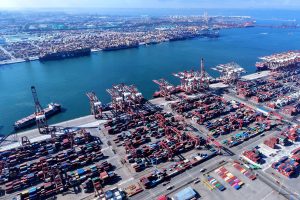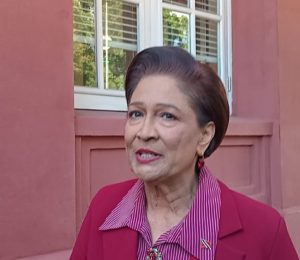LONDON, Sept 16, CMC -The London-based Judicial Committee of the Privy Council Monday unanimously dismissed an appeal filed by a public officer, Terrisa Dhoray, saying that the Trinidad and Tobago Revenue Authority Act does not breach the Constitution.
“We won the case. This required tremendous effort against the relentless opposition from the UNC(United National Congress) and the PSA (Public Service Association). Now we can modernise revenue collection,” Finance Minister Colm Imbert said in a brief statement following the Privy Council ruling.
Lady Simler, who gave the unanimous judgment of the Privy Council, which is Trinidad and Tobago’s highest and final court, said the correct approach in this appeal is to focus on the rationale or purpose of chapter 9 of the Constitution.
The five-member Privy Council said it is also to focus on the protections for public officers which it contains, in order to determine whether devolving tax functions to the Authority contradicts its terms or the assumptions on which it is based
“This is preferable to the approach taken by the Court of Appeal, which sought to distinguish between core governmental functions, which must be performed by public officers, and other governmental functions, which can be transferred,” the Privy Council ruled.
The Trinidad and Tobago Revenue Authority Act, Act No 17 of 2021 was passed by the Parliament of Trinidad and Tobago by a simple majority in 2021, and received the assent of the President on 23 December 2021.
The Act creates the Trinidad and Tobago Revenue Authority, (TTRA), a new, semi-autonomous body with functions which have to date been performed by the Inland Revenue Division and the Customs and Excise Division, both departments of central government in the Ministry of Finance.
Staff currently employed in those Divisions are designated as “public officers” under the 1976 Constitution of the Republic of Trinidad and Tobago, which entitles them to certain constitutional protections under chapter 9 of the Constitution.
These include the vesting of power to appoint public officers in the Public Service Commission, which also has the power to promote, remove and exercise disciplinary control over public officers employed in the service of the government. By means of the Public Service Commission and chapter 9 protection, public officers are immunised from improper political pressure and interference.
Under the Act, a significant proportion of staff employed to discharge the revenue functions devolved to the TTRA will not be “public officers” within the meaning of the Constitution and will not attract chapter 9 protection.
Dhoray, a Customs and Excise officer, had brought a claim in the High Court against the Trinidad and Tobago government seeking a declaration that the Act is inconsistent with the Constitution because it devolves revenue functions to the Authority to be carried out by private employees, rather than public officers.
The High Court dismissed the appellant’s claim. She appealed to the Court of Appeal, which upheld the High Court’s decision.
In its ruling on Monday, the Privy Council unanimously dismisses the appellant’s appeal, holding that TTRA Act does not breach the Constitution.
Lady Simler said that the rationale for the chapter 9 protection is twofold.
First, the independent Service Commissions provided for by the Constitution are composed, structured and regulated to ensure that public officers are independent and immune from political pressure.
The Privy Council said the purpose of giving public officers security of tenure and protection from political interference in decisions on appointment, transfer and promotion is to protect them from the political influence or interference to which they would otherwise be vulnerable by the government of the day.
Secondly, the public are protected from the effects of such political interference by having a cadre of public servants who can act independently of any particular government. In both cases, the risk to public servants and to the public arises from the fact that these public officers are institutionally part of government and subject to the direction of ministers
But the Privy Council noted that there are no express provisions of the Constitution which require that core government functions are only performed or delivered by public officers covered by chapter 9.
By contrast, section 74(3) of the Constitution is consistent with the Constitution expressly authorising Parliament to transfer executive functions to persons other than the President
The Privy Council noted that since the rationale of chapter 9 is to protect public officers and indirectly the public from improper political pressure by virtue of the fact that public officers are institutionally part of government, if the function performed by such officers is removed from government and put into the hands of a separate statutory body, there is no longer any need for those protections, provided that two conditions are satisfied.
First, the separate statutory body must be genuinely independent and not a device or a sham. Secondly, there must be adequate and effective safeguards to ensure that there is in fact independence and sufficient protection for employees from political interference from the executive [
“In this case, both conditions are met. There is no suggestion that the creation of the Authority was a device or a sham, and there are effective safeguards to protect the staff and officers of the Authority and members of the public from executive interference. Accordingly, the Act is not inconsistent with the Constitution,” the Privy Council ruled.
![]()












